
page_listing.tpl
page_subListingDetails.tpl
sub_listingDetails_style1.tpl
sub_listingDetails.title.tpl
habēre to have
habēre is a Latin Verb that primarily means to have.
Definitions for habēre
Wheelock's Latin
Verb
- 1
to have, hold, possess, consider, regard
English derivatives:
inhabit "hold in"; ex-hibit "hold forth"; habit habitat
Oxford Latin Dictionary
Verb
- 1
To have, own, possess (property). (b) (in commands, etc.) to take possession of.
- 2
To have with one or in one's keeping; ~s, there you have. (b) to have on, wear, carry. (c) (w. secum. etc.) to have with one or in one's company.
- 3
To have, possess (physical features or faculties, appendages, etc.).
- 4
To have attached or belonging in a non-material sense (a quality, attribute, function, right, etc.): (a) (of persons). (b) (of things).
- 5
To have (a person acting in a particular capacity). (b) (a relation, husband, etc.).
Sentences with habēre
Latin to English
Sī multōs amīcōs habēre vīs, nōlī esse superbus.Compare If you wish to have many friends, do not be arrogant.
Vīsne habēre multum sapientiae? Studē Latīnae!Compare Do you wish to have much wisdom? Study Latin!
Unus aut summus alter proelium arx et caput Italia in manus habeo.Compare By one or at most by a second battle we shall have the citadel and capital of Italy in our hands.
De hic deus idem fere, qui reliquus gens, habeo opinio.Compare Concerning these gods they have almost the same opinion as other nations.
Lucus ille laetus in medium pascua habeo, ubi omnis genus sacer dea pascor pecus sine ullus pastor.Compare That grove has in its centre fair pastures, where cattle of every sort, sacred to the goddess, were grazing without any keeper.
Auxilium satis superque habeo; sed qui multus sum, multus res egeo.Compare I have enough and too many allies; but the more numerous we are, the more things shall we require.
Habeo senectus magnus gratia, qui ego sermo aviditas augeo.Compare I feel great gratitude to old age, which has increased my eagerness for conversation.
Quot līberōs habēbat lībertus? Septem habēbat.Compare How many children did the freedman have? He had seven.
Conjugation table for habēre
Cactus2000
| ACTIVE | |
| Indicative present | Indicative imperfect |
| habeō habēs habet habēmus habētis habent | habēbam habēbās habēbat habēbāmus habēbātis habēbant |
| Indicative perfect | Indicative pluperfect |
| habuī habuistī habuit habuimus habuistis habuērunt / habuēre | habueram habuerās habuerat habuerāmus habuerātis habuerant |
| Indicative future | Indicative future perfect |
| habēbō habēbis habēbit habēbimus habēbitis habēbunt | habuerō habueris habuerit habuerimus habueritis habuerint |
| Subjunctive present | Subjunctive imperfect |
| habeam habeās habeat habeāmus habeātis habeant | habērem habērēs habēret habērēmus habērētis habērent |
| Subjunctive perfect | Subjunctive pluperfect |
| habuerim habueris habuerit habuerimus habueritis habuerint | habuissem habuissēs habuisset habuissēmus habuissētis habuissent |
Infinitive present habēre Infinitive perfect habuisse Infinitive future habitūrum esse | Imperative present habē habēte Imperative future habētō habētō habētōte habentō |
| PASSIVE | |
| Indicative present | Indicative imperfect |
| habeor habēris habētur habēmur habēminī habentur | habēbar habēbāris / habēbāre habēbātur habēbāmur habēbāminī habēbantur |
| Indicative perfect | Indicative pluperfect |
| habitus sum habitus es habitus est habitī sumus habitī estis habitī sunt | habitus eram habitus erās habitus erat habitī erāmus habitī erātis habitī erant |
| Indicative future | Indicative future perfect |
| habēbor habēberis / habēbere habēbitur habēbimur habēbiminī habēbuntur | habitus erō habitus eris habitus erit habitī erimus habitī eritis habitī erunt |
| Subjunctive present | Subjunctive imperfect |
| habear habeāris / habeāre habeātur habeāmur habeāminī habeantur | habērer habērēris / habērēre habērētur habērēmur habērēminī habērentur |
| Subjunctive perfect | Subjunctive pluperfect |
| habitus sim habitus sīs habitus sit habitī sīmus habitī sītis habitī sint | habitus essem habitus essēs habitus esset habitī essēmus habitī essētis habitī essent |
Infinitive present habērī Infinitive perfect habitum esse Infinitive future habitum īrī | Imperative present habēre habēminī Imperative future habētor habētor - habentor |
| PARTICIPLE | ||
| Participle present active | ||
| Nom. | habēns | habentēs |
| Gen. | habentis | habentium |
| Dat. | habentī | habentibus |
| Acc. | habentem | habentēs |
| Abl. | habente | habentibus |
| Participle future active | ||
| Nom. | habitūrus | habitūrī |
| Gen. | habitūrī | habitūrōrum |
| Dat. | habitūrō | habitūrīs |
| Acc. | habitūrum | habitūrōs |
| Abl. | habitūrō | habitūrīs |
| Participle perfect passive | ||
| Nom. | habitus | habitī |
| Gen. | habitī | habitōrum |
| Dat. | habitō | habitīs |
| Acc. | habitum | habitōs |
| Abl. | habitō | habitīs |
| Gerundive | ||
| Nom. | habendus | habendī |
| Gen. | habendī | habendōrum |
| Dat. | habendō | habendīs |
| Acc. | habendum | habendōs |
| Abl. | habendō | habendīs |
| Gerund | Supine | |
| Nom. | habēre | habitum |
| Gen. | habendī | habitū |
| Dat. | habendō | |
| Acc. | habendum | |
| Abl. | habendō | |
Data sources
Notes
- Definitions
- Frederick M. Wheelock, Wheelock's Latin, 6th ed., rev. Richard A. LaFleur (New York, NY: HarperCollins Publishers, 2005): 21.
- P. G. W. Glare, Oxford Latin Dictionary, Vols. 1-8 (Oxford: Clarendon Press, 1982): 780.
- Word frequencies
- Christopher Francese, "Latin Core Vocabulary," Dickinson College Commentaries, last modified 2014, http://dcc.dickinson.edu.
- Paul B. Diederich, The Frequency of Latin Words and Their Endings, PhD diss., (Columbia University, 1939).
Bibliography
Allen, Joseph H. Allen and Greenough's New Latin Grammar for Schools and Colleges: Founded on Comparative Grammar. Edited by James B. Greenough, George L. Kittredge, Albert A. Howard, and Benjamin L. D'Ooge. Boston, MA: Ginn & Company, 1903.
Crystal, David. A Dictionary of Linguistics and Phonetics. 6th ed. Oxford, UK: Blackwell Publishing, 2008.
Delatte, Louis, Suzanne Govaerts, Joseph Denooz, and Etienne Evrard. Dictionnaire fréquentiel et index inverse de la langue latine [Frequency Dictionary and Inverse Index of the Latin Language]. Liège, Belgium: Laboratoire d'analyse statistique des langues anciennes de l'Université de Liège (L.A.S.L.A.), 1981.
Diederich, Paul B. The Frequency of Latin Words and Their Endings. PhD diss., Columbia University, 1939.
Francese, Christopher. "Latin Core Vocabulary." Dickinson College Commentaries. Last modified 2014. http://dcc.dickinson.edu/latin-vocabulary-list.
Gildersleeve, Basil L., and Gonzales Lodge. Gildersleeve's Latin Grammar: Third Edition, Revised, and Enlarged. 3rd ed. London, England: Macmillan and Co., 1903.
Glare, Peter G.W. Oxford Latin Dictionary. Vols. 1-8. Oxford, England: Clarendon Press, 1982.
Krüger, Bernd. "Latin Conjugation Tables." Cactus2000. Accessed May 5, 2023. https://latin.cactus2000.de/index.en.php.
Pierson, Nick. "Sound of Text." Accessed October 26, 2019. https://soundoftext.com.
Wheelock, Frederick M. Wheelock's Latin. 6th ed. Revised by Richard A. LaFleur. New York, NY: HarperCollins Publishers, 2005.
Wiktionary Contributors. "Victionarium." Wikimedia Foundation, Inc. Updated March 18, 2019. https://la.wiktionary.org/wiki/Victionarium:Pagina_prima.
Citation
Chicago (17th ed.)
Allo Contributors. "habeō, habēre, habuī, habitum (v.) - Latin Word Definition." Allo Latin Dictionary. Last modified . Accessed February 20, 2026. http://ancientlanguages.org/latin/dictionary/habeo-habere-habui-habitum.
Entry created on . Last updated on .









